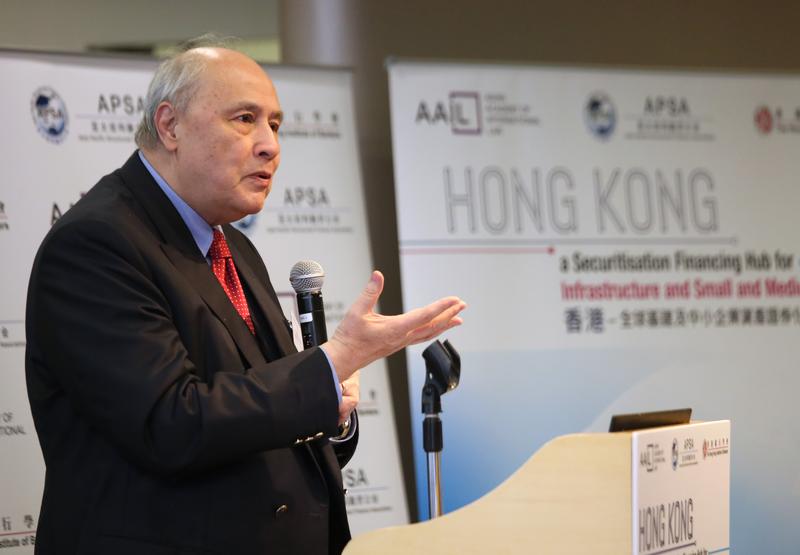 Anthony Francis Neoh, chief adviser to the China Securities Regulatory Commission, talks about Hong Kong financial sector during a meeting on Monday. (PHOTO PROVIDED TO CHINA DAILY)
Anthony Francis Neoh, chief adviser to the China Securities Regulatory Commission, talks about Hong Kong financial sector during a meeting on Monday. (PHOTO PROVIDED TO CHINA DAILY)
With financial services constituting some 20 percent of Hong Kong’s gross domestic product, there’s much scope for creating more jobs in the financial sector through the securitization proposals made in a newly released white paper, said Anthony Francis Neoh, chief adviser to the China Securities Regulatory Commission.
The report, titled “Hong Kong – a Securitization Financing Hub for Infrastructure and Small and Medium Enterprises”, was jointly unveiled by the Asia-Pacific Structured Finance Association, the Hong Kong Institute of Bankers and the Asian Academy of International Law.
Securitization is simply about cash flow, which isolates cash flow from the risks and channel it to investors
James Pedley, a foreign legal consultant at Clifford Chance
“These securitization proposals will complete the last remaining elements which will make Hong Kong the ‘international hub for securitization’ of Asia, catering to international infrastructure projects and the securitization of small and medium enterprises financing in the Guangdong-Hong Kong-Macao Greater Bay Area,” said Neoh, who’s also a special adviser to the report.
“That will create a revolution in at least the same scale as that of H shares, if not more,” he said.
James Pedley, a foreign legal consultant at Clifford Chance, explained that securitization is simply about cash flow, which isolates cash flow from the risks and channel it to investors.
He said the report has set out a number of steps to be taken to further implement laws, regulations, tax rules and market infrastructure to support the securitization market.
Positioned as a global financial center for the Bay Area, Hong Kong can look at how securitization has been used successfully elsewhere and bring back the securitization technology to make it adapt to local variations, Pedley said.
Located right next to the world’s second-largest securitization market, Hong Kong should leverage i ts strengths in cross-border investment, said Kyson Ho, managing director and head of structured finance, Asia-Pacific, at HSBC.
He said the market should open up and remove the hurdles for professionals.
Heading in this direction will not only stimulate the local economy, but also create wealth to draw from in future, said Carrie Leung, chief executive officer of Hong Kong Institute of Bankers.
Moreover, she believes it would help the growth of regional small and medium enterprises, and would be allocating fresh funds for infrastructure projects under the Belt and Road Initiative.
Leung also stressed the importance of talents as essential building blocks for the plan, saying Hong Kong needs a deep pool of multi-disciplinary professionals capable of handling complex securitization, structured finance concessions, managing cross-border model, as well as financial regulation issues to ensure they can keep up with international standards.
Howard Lee, deputy chief executive of the Hong Kong Monetary Authority, reckoned that asset securitization would allow market participants to have alternative financing channels.
Securities companies under the HKMA had begun implementing infrastructure financing and securitization businesses in January last year, he said, adding that the objective is to secure global infrastructure loans from banks and package them as a diversified portfolio of assets, following loan securitization.
“Therefore, I truly appreciate the report, which serves as a catalyst for market collaboration to further consolidate Hong Kong as a securitization financing hub,” Lee said.
The move, he said, would bring huge benefits to many sectors in Hong Kong, including banking, asset management and legal engineering.


